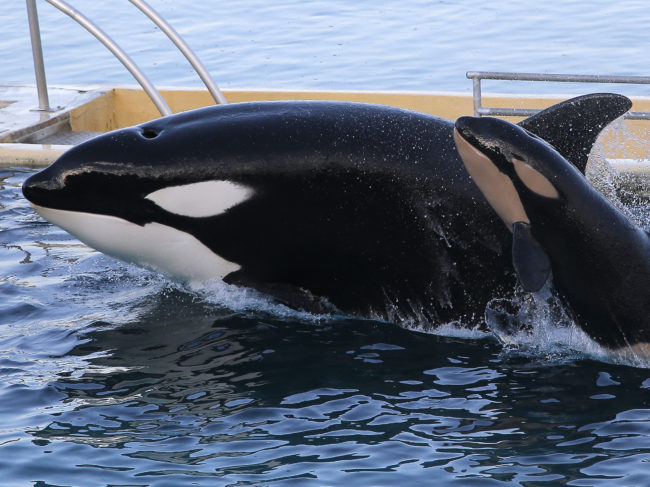
Lionel Cironneau/AP
Last Friday in the Washington Post, Charles Krauthammer asked which contemporary practices will be deemed “abominable” in the future, in the way that we today think of human enslavement.
He then offered his own opinion:
“I’ve long thought it will be our treatment of animals. I’m convinced that our great-grandchildren will find it difficult to believe that we actually raised, herded and slaughtered them on an industrial scale — for the eating.”
Krauthammer goes on to predict that meat-eating will become “a kind of exotic indulgence,” because “science will find dietary substitutes that can be produced at infinitely less cost and effort.”
I don’t often agree with Krauthammer’s views, and his animal column is no exception. His breezy attitude on animal biomedical testing does animals no favors. (It’s perhaps only fair to note that I have similar concerns about Alva’s conclusions on animal testing from his 13.7 post published that same day.)
But, still, Krauthammer does a terrific job of awakening people to many issues related to animals’ suffering. And he’s not alone. On April 17, I joined other scientists and activists on the radio show To the Point hosted by Warren Olney, to discuss this question: Is Animal Liberation Going Mainstream? In the 34-minute segment, we discussed the public outcry against SeaWorld’s treatment of orcas, Ringling Bros.’ plan to retire elephants from the circus in three years, and the rightness or wrongness of keeping animals in zoos — all issues brought up by Krauthammer in his column.
But why now? What combination of factors is moving our society at this specific point in time toward greater concern for animal welfare? I posed this question to Lori Marino, executive director for The Kimmela Center for Animal Advocacy and, on Monday, she responded by email in this way:
“Most changes in public attitudes are due to the scientific exploration of behavior and cognition in other animals and the translation of that knowledge into the public mindset. Now, more than ever, many people accept that other animals have thoughts, feelings and, indeed, autonomous lives to live. We’re seeing changes in how the public feels about keeping wild animals captive for entertainment and biomedical research, the legal status of other animals with the groundbreaking work of the Nonhuman Rights Project, and in plant-based diets slowly but surely becoming part of the “cultural furniture” in many parts of the world.
So, we can credit science for revealing to us the many complex levels of intelligence and sensitivities in other animals. Of course, science is always a double-edged sword, and the same scientific endeavors which have led to increased awareness of other animals have also opened up new windows of opportunities to exploit many of those same animals.
With our increasing capabilities in genomics, molecular biology, cloning and neuroscience, we are now capable of manipulating other animals in more invasive ways than ever. One need only think about the commercial catalogs for genetically engineered mice, the overuse of antibiotics in factory farmed animals, and the glint of genetic monster-making in the growing efforts at de-extinction. (Science is one aspect of our global exploitation of animals; the commercial market for animal parts and labor, climate change and habitat destruction have forced this planet into the current sixth mass extinction event.)
So the answer to this question depends upon one’s perspective. I wish I could say that the groundswell of increasing awareness and concern for other animals is a global phenomenon. But, I am keenly aware of how my standpoint is shaped by being ensconced in the animal protection world and how cautious I need to be about over-reaching conclusions. Instead, every day I try to see things from the 32,000 foot perspective. When you look from that vantage point the situation is not very encouraging.
Overall, I see two parallel paths into the future. One represents growing understanding, compassion and unity with our fellow animals. The other represents the increasing exploitation and abuse. It is probably too late to turn everything around for the planet. But we can all make a difference for other animals on an individual level and, in the process, maybe salvage the dignity of our own species as well.”
Through Marino’s words, we can see that the answer to “why now” is intimately tied to advances not only in scientific techniques but also in the questions scientists bring with them into the field. It’s a building crescendo: Studies of wild elephants, orcas and chimpanzees reveal that these animals live in layered, complex societies and cooperate in the expression of intelligent and/or emotional acts; those revelations lead in turn to scientists’ deciding to test hypotheses about intelligent and emotional action in other animals. What we’re finding out about fish cognition and sentience alone represents an exciting new development — and new scientific developments make their way into the public consciousness about animals’ lives, as Marino notes.
While I feel that it’s important to celebrate recent strides in animal welfare, including those mentioned by Krauthammer in his column, I also take note of Marino’s bottom-line caution. Invasive, experimental and, in many cases, unethical science on animals continues in traditional ways on species ranging from monkeys to mice, and also in novel ways rooted in modern technologies like cloning and other forms of genetic manipulation.
The best question for animals really isn’t “Why now?” but “What’s next?” in the sense of “What can we do next to help and protect animals?” One key answer to that question brings us right back to Krauthammer on meat: As a panel of U.S. nutritional experts recommends, we can adopt a more plant-based diet.
Barbara J. King, an anthropology professor at the College of William and Mary, often writes about human evolution, primate behavior and the cognition and emotion of animals. Barbara’s most recent book on animals was released in paperback in April. You can keep up with what she is thinking on Twitter: @bjkingape.
9(MDEwMjQ0ODM1MDEzNDk4MTEzNjU3NTRhYg004))
